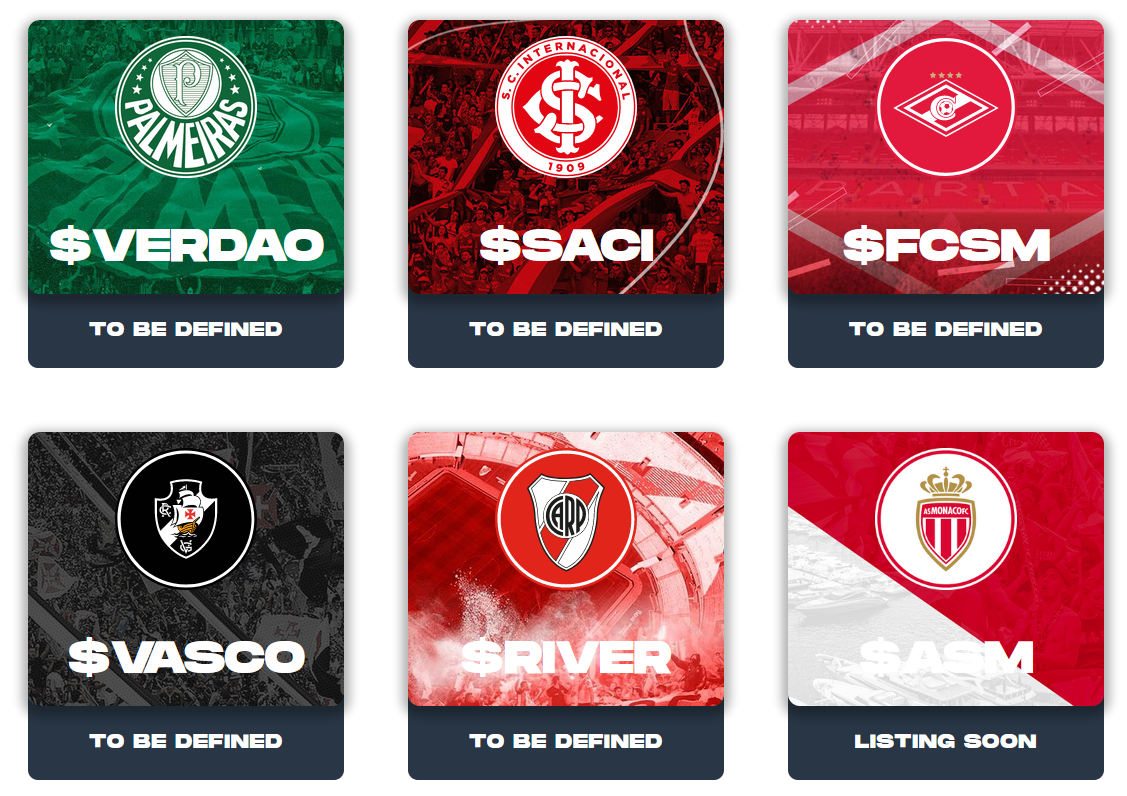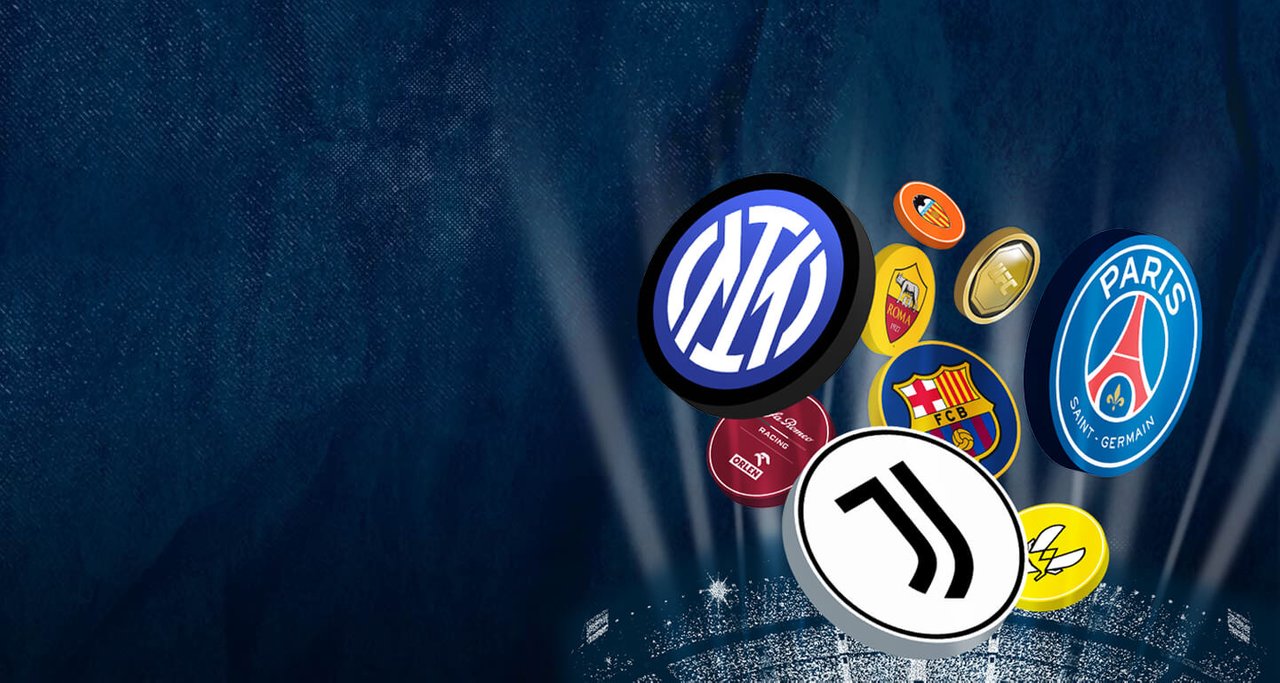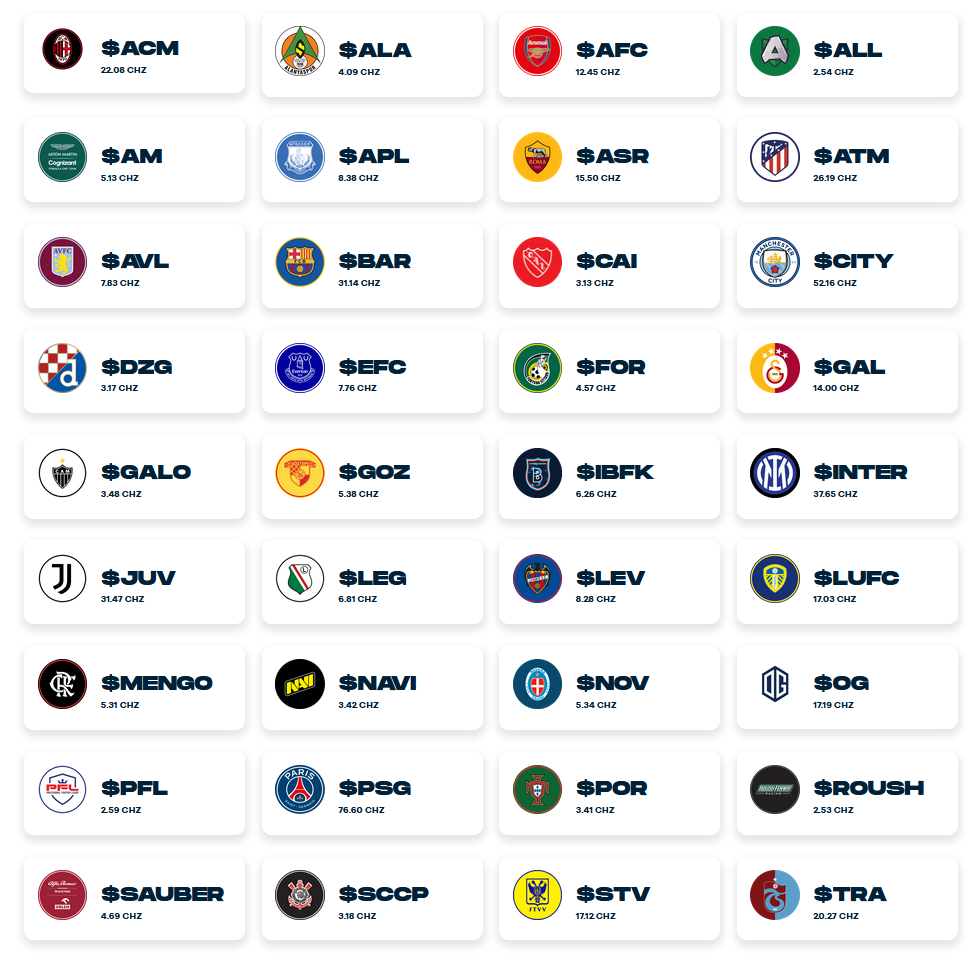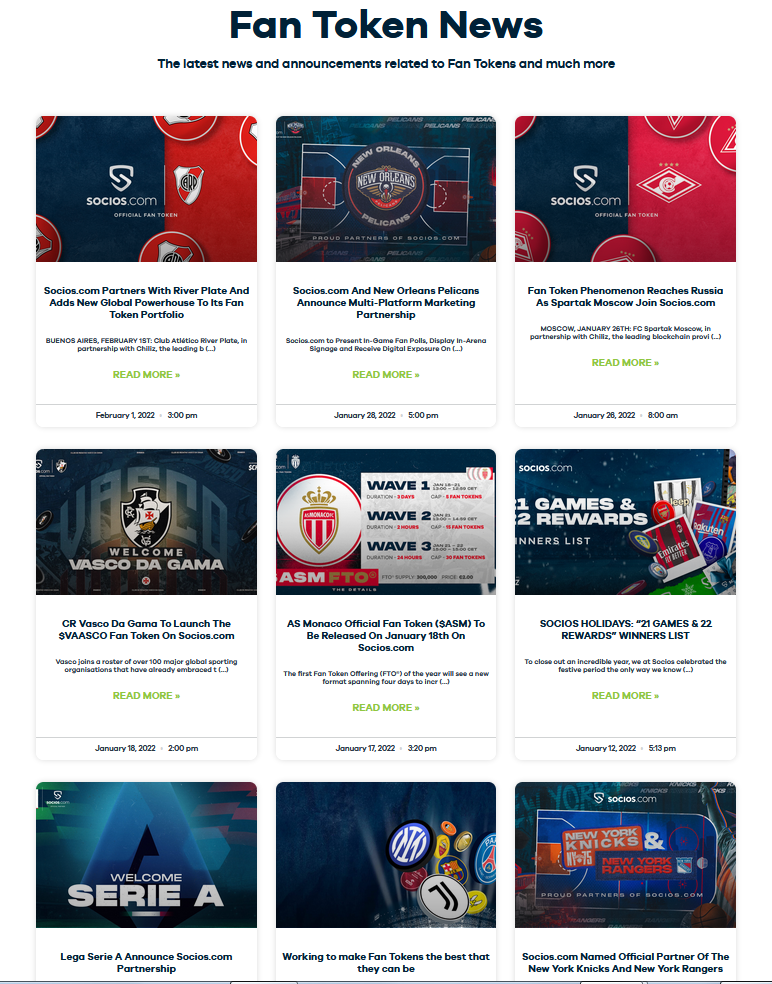Sports tokens and their importance in the new digital economy. [ENG] / Los tokens deportivos y su importancia en la economía de la nueva era digital. [ESP]
2 comments

Tokens have represented - and are representing - throughout their recent short history a resource of singular importance for online wallets, exchanges and other fundamental instruments for the management of cryptocurrencies. So far, nothing new. We are in the presence of the so-called "virtual reality", cryptocurrencies themselves are.
What nobody would have imagined until recently - least of all the sports directors of so many for-profit and non-profit societies and associations around the world - is that these tokens could be a lifesaver - economically and financially speaking, of course - they could represent an economic resource of singular importance and could become the anchor of salvation for so many football clubs.
The world of sport - and of football in particular - is undergoing a true revolution of its own, discovering digital assets and resources that were unimaginable until just over a year ago.
And the coronavirus pandemic, with its aftermath of deaths, sickness, desolation and fear, brought with it the possibility of economic reinvention for many club managers who, in their daily lives, are financial directors, CEOs of important companies, industrialists and in general people closely linked to the traditional financial and economic world that has governed the sports economy in recent years.
An economy that, at the time and thanks to the constant subscriptions of the fans, brought millions of dollars to the coffers of the clubs that were then (mis)spent on exhorbitant players with salaries and bonuses far higher than those of any manager of a large company.
Covid-19 put an end to this illusory bubble. The economic crisis of many clubs deepened and many others took it as a warning. Salaries were reduced and many players, faced with this alternative, preferred not to renew their contracts and leave on a free transfer (Messi, for example, to PSG). Or for a tiny figure in relation to the current power of their power (e.g. Cristiano Ronaldo from Juventus to Manchester United for "little more" than 20 million euros).
This circumstance increased the uncertainty even more, players began to go on loan from one club to another, and the red of the corporate balance sheets became more and more accentuated, running the risk of being prevented by FIFA from competing in prestigious international tournaments and, in short, bankruptcy itself.
It is in this context that the tokens that until recently some platforms promoted, sold and/or gave away, according to their requirements, to lay the foundations of a future project, have emerged.
HIVE users know very well what a token is, but it is not a bad idea to refresh some concepts:
A digital token is nothing more or less than a unit of value created to have a specific purpose and value.
The concept, to some extent, is confused with that of cryptocurrencies themselves, only that tokens, at present, are not directly exchangeable as a means of payment and store of value and therefore must be exchanged by establishing a parity with a known cryptocurrency. This is what exchanges do.
Today a token is a digital asset that has a specific value and can be transformed into real money in a few moments, carry out a DeFi operation (decentralised finance), play online or activate a reward system, or carry out transactions - for example Ethereum is considered a cryptocurrency and at the same time a token since Ether is used within Ethereum to facilitate transactions between users.

The examples are thousands and I have tried to share a basic and elementary notion of this concept to get to the reason that have driven the big football clubs of the world as a real digital asset in their economy.
We could talk about NFT tokens in gaming, in art and in many other aspects. But this is not the point.
Until a few years ago a "token" was the token that allowed us to unlock the shopping trolley at the supermarket, the token at the automatic car wash or even used by some banks with a one-time self-generated code that was used to enter our account.
Nowadays it is a fundamental resource in the economy of many football clubs.
A few days ago one of the two main Argentinean football clubs, River Plate, reached an agreement with the leading company Socios.com to tokenise its sports economy.
Each member will receive 1 free token (the value of which is still to be determined), which will give them access to numerous benefits with the only requirement of having their membership fee up to date - one of the biggest problems for football clubs in the problems of football clubs nowadays.
The club will incorporate the commercial partner owned by the Chiliz group as a sponsor and will receive a sum of around 30 million dollars over five years.
Even the star Lionel Messi reached an agreement as a free player with PSG after leaving Barcelona thanks to the fact that a large part of his lucrative salary was received in tokens from that French club, the first to implement the French club, the first to implement the innovative sports marketing strategy.
So far, FC Barcelona, Juventus, Manchester City, Manchester City, Paris Saint-Germain, Atlético Madrid, AS Roma, Arsenal, Galatasaray, OG, Team Heretics, UFC, Apollon Limassol, SS Lazio, Trabzonspor, BSC Young Boys, İstanbul Başakşehir, Team Alliance, Universidad de Chile, A.C. Milan and Argentina National Team among others.
Fan Tokens are collectible digital assets, created on the Chiliz blockchain on an idea of Alexandre Dreyfus French entrepreneur dedicated for several years to online gambling and sports betting.
As if that were not enough, a few hours ago the agreement was disclosed through which the renowned exchange Binance will be the sponsor of the new 2022 edition of the Professional Football League.


Los tokens han representado -y está representando- a lo largo de su reciente y corta historia un recurso de singular importancia para monederos online, exchanges y otros instrumentos fundamentales para la gestión de las criptomonedas. Hasta aquí ninguna novedad. Estamos en presencia de la llamada "realidad virtual", las mismas criptomonedas lo son.
Lo que hasta hace poco nadie se hibiera imaginado -y mucho menos los dicrectores deportivos de tantas sociedades y asociaciones -con y sin fines de lucro- en todo el mundo es que estos tokens podían salvarla la vida -económica y financieramente hablando claro está-, podían representar un recurso econoómico de singular importancia y podían transformarse en el ancla de salvación de tantos clubes de fútbol.
El mundo deportivo -y del fútbol en particular- está viviendo una verdadera y propia revolución descubriendo activos y recursos digitales que hasta hace poco más de un año era inimaginables.
Y la pandemia del coronavirus, con su secuela de muertes, enfermos, desolación y miedo, trajo aparejada la posibilidad de reinventarse económicamente en muchos directivos de clubes que, en su vida cotidiana, son directores financieros, CEO de importantes empresas, industriales y en general personas estrechamente ligadas al mundo tradicional financiero y económico que gobernó la economía de los deportes en los últimos.
Una economía que, en su momento y gracias a los constantes abonos de los fans, llevó millones de dólares a las arcas de los clubes que después fueron (mal)gastados en fichas exhorbitantes de jugadores con niveles de sueldos y plus muy superiroes a los de cualquier directivo de una gran empresa.
El Covid-19 acabó con esta burbuja ilusoria. Se acrecentó la crisis económica de muchos clubes y muchos otros la tomaron como advertencia. Los sueldos fueron rebajados y muchos jugadores ante esta alternativa prefirieron no renovar su contrato e irse en calidad de libres con el pase en su poder (Messi por ejemplo al PSG). O por una cifra ínfima con respecto al poder actual de su poder (por ejemplo Cristiano Ronaldo de la Juventus al Manchester United por "poco más" de 20 millones de euros).
Esta circunstancia aumentó aún más la incertidumbre, los jugadores comenzaron a pasar a préstamo de un club a otro, y el rojo de los balances societarios se acentuó cada vez más corriendo el riesgo que la FIFA les impidiera competir en torneo internacionales de mucho prestigio y, en definitiva, la bancarrota misma.
En este contexto surgen los tokens que hasta hace no mucho algunas plataformas promocionan, vendían y/o regalaban, según sus exigencias, para sentar las bases de un futuro proyecto.
Los usuarios de #HIVE saben muy bien que es un token pero no está mal refrescar algunos conceptos:
Un token (una "ficha en español) digital no es ni más ni menos que una unidad de valor creada para que tenga una finalidad y un valor determinado.
El concepto, en cierta medida se confunde con el de las criptomonedas en si mismo, solo que los tokens, en la actualidad, no son intercambiables directamente medio de pago y reserva de valor y por lo tanto deben ser cambiados estableciendo una paridad con una criptomoneda conocida. Es lo que hacen los exchanges.
En la actualidad el token es un activo digital que tiene un valor concreto y puede ser transformado en dinero real en pocos instantes, llevar a cabo una operación DeFi (finanzas descentralizadas), jugar on line o activar un sistema de recompensas, o efectuar transacciones -por ejemplo Ethereum es considerada una criptomoneda y a su vez un token ya que Ether es utilizada dentro de Ethereum para facilitar las transacciones entre usuarios.

Los ejemplos son miles y he tratado de compartir una noción básica y elemental de este concepto para llegar al motivo que han impulsado a los grandes clubes de fútbol del mundo como un verdadero activo digital en su economía.
Podríamos hablar de los tokens NFT en los juegos, en el arte y en muchos otros aspectos más. Pero el objetivo no es éste.
Hasta hace unos años atrás un "token" era la ficha que nos permitía desbloquear el carrito del supermecado, la ficha del lavadero de autos automático o incluso eran usadas por algunos bancos con un código autogenerado por única vez que servía para entrar en nuestra cuenta.
Hoy en día es un recurso fundamental en la economía de muchos clubs de fútbol.
Hace pocos días uno de los dos principales clubes del fútbol argentino, River Plate, llegó a un acuerdo con la empresa Socios.com lider en el sector, para tokenizar su economía deportiva. Cada socio recibirá 1 token gratis (cuyo valor debe todavía ser determinado), con lo cuál podrá acceder a numerosos beneficios con el único requisito de tener su cuota social al día -uno de los mayores problemas de las entidades de fútbol en la actualidad-.
El club incorporará como sponsor al partner comercial propiedad del grupo Chiliz y percibirá en cinco años una suma cercana a los 30 millones de dólares.
Incluso el astro Lionel Messi llegó a un acuerdo como jugador libre con el PSG después de dejar el Barcelona gracias a que, una buena parte de sus suculento sueldo lo percibirá en tokens de ese club francés, el primero en implementar la novedosa estrategia de marketing deportivo.
Hasta ahora los equipos adheridos son FC Barcellona, Juventus, Manchester City, Paris Saint-Germain, Atlético Madrid, AS Roma, Arsenal, Galatasaray, OG, Team Heretics, UFC, Apollon Limassol, SS Lazio, Trabzonspor, BSC Young Boys, İstanbul Başakşehir, Team Alliance, Universidad de Chile, A.C. Milan y la Selección Argentina entre otros.
Los Fan Tokens son activos digitales coleccionables, creados en la blockchain de Chiliz sobre una idea de Alexandre Dreyfus empresario francés dedicado desde hace varios años a los juegos de azar online y apuestas deportivas.
Como si eso fuera poco hace escasas horas se divulgó el acuerdo a través del cual el reconocido exchange Binance será el patrocinador de la nueva edición 2022 de la Liga Profesional de Fútbol.


Comments